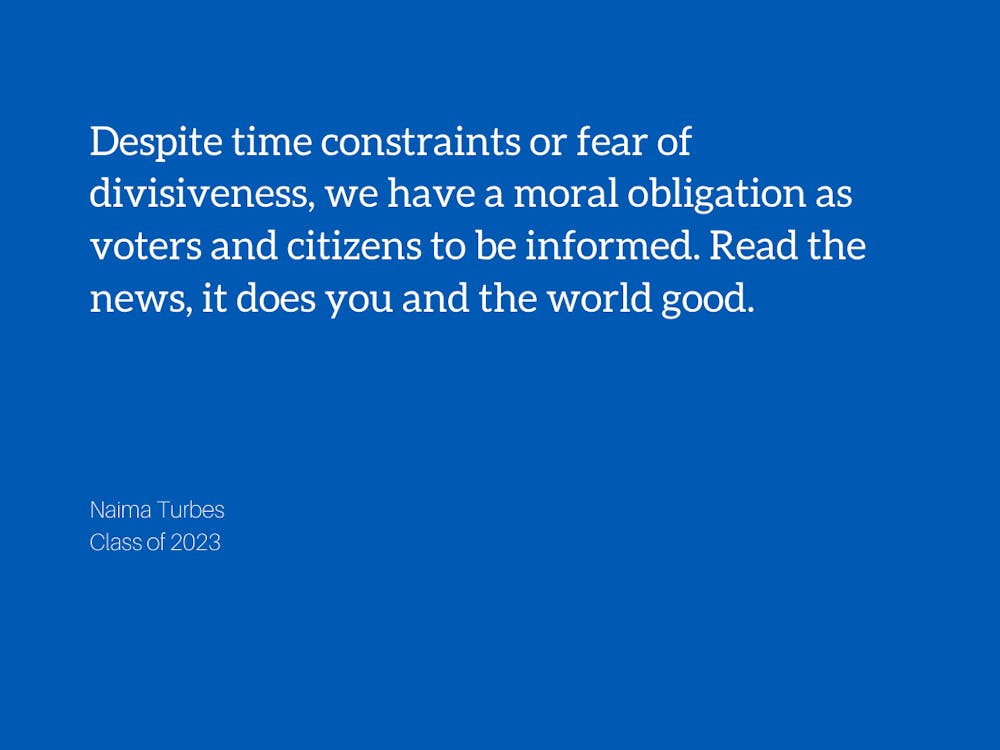Fake news makes good programming. From elaborately spun stories on Fox News to articles on The Onion, these entertainment stories are more appealing than understanding current events. When was the last time you remembered a fact about a celebrity but could not cite a recent news story?
I think of Jimmy Kimmel’s Lie Witness News where he interviews strangers about fake news stories and receives bald faced lies as responses. He leaves the viewer both laughing and worried about how easily susceptible and uninformed many of us are. While some may be quick to dismiss the opinions of people on the streets of Los Angeles, the same lack of awareness about top news events holds true on our Duke Campus.
I interviewed several students on campus about the impeachment trials against President Trump happening right now. In classic Lie Witness News style, however, some of the questions were open ended to understand what students know, but many of the questions were verifiably false.
Answers to questions simply about what the general premise of impeachment largely centered around Russia.
“Russia. Blackmail. Dark internet or whatever,” said one sophomore.
Another junior responded, “I have no idea. Probably Russia. No! Afghanistan. Final answer.”
When asked if she was surprised to hear that the recent hearings implicated Vice President Mike Pence as a potential whistleblower, one sophomore responded, “No. Definitely not. If you are the vice president of Trump you definitely know shit!”
Pence was not mentioned as a potential whistleblower.
The quickness and confidence of her answer scared but did not surprise me. Not only are many of us walking around this campus oblivious to what will undoubtedly be a historic impeachment trial and presidency, but we fake knowledge. If you don’t know it, own it. I would rather have someone outrightly admit to their ignorance than feign knowledge. It is in this need to pretend to know mindset that the facts get lost. Embarrassed of ignorance, we are more likely to accept false stories. Somewhere we dismiss our responsibility to decipher and synthesize multiple news sources.
In addition to the consequences of ignorance and unfounded confidence, the motivations behind some of the responses troubled me. Why do we pretend to know current events? Is it that we think we should know? Why do we feel guilty or judged for not regularly checking the news?
As a senior noted, “I should be way more in the loop with things. I am trying to make an effort this year, but it is really not working.”
In today’s era of fake news we all need to be vigilant about what we consume. I think of the recent elections in North Carolina and the impending presidential election as a constant reminder of my role as a contributing citizen to read the news. Frankly, voting without an effort to understand current events is unethical.
For some, however, following politics comes at the expense of relationships. This time of year, especially, I am reminded of the Thanksgiving dinner table ruined by the mention of political candidates or divisive issues.
“I just don’t like it. I don’t like confrontation,” said one freshman, corroborating this fear of division. “When I think of news I think of arguments, and I am tired of tuning into the news to hear opinions rather than facts.”
There is a lot of merit to these words. As seen by fake news or swayed stories, our sense of news and opinion has been almost purposefully convoluted. However, the divisiveness of current media is exactly why we need more people invested in politics. By understanding current events, we can counter a black and white depiction of modern politics and help color conversations with diverse people and experiences.
I should note that there were multiple students interviewed with a more in depth understanding of current news events and the impeachment than me. One freshman quoted a line from testimony earlier in the day and proceeded to tell me the implications of the statement on the trial at large.
In my own experience, I fall somewhere in the middle of the current events knowledge spectrum. I pride myself on regularly checking the news, but often fall short in my understanding of current events.
I have learned to lean into the differences, the diversity of experiences, the depth of knowledge and biases that many discussions on campus have. I would much rather spend a night in Perkins whispering about the ramifications of another school shooting than completing any problem set. It’s these moments that bring me closer to my friends and this campus.
Please follow the news. From different sources. From different points of view. Know how people in Kansas think and what people in New York think and what you think about an issue. Talk to you friends about politics and set aside fears of conflict.
I would argue that it is only when we agree on the facts that we can have any discussion or sense of community. When we read and educate ourselves that we can ever bridge the divides that already separate us.
Naima Turbes is a Trinity first-year. Her column, “mind over matter,” runs on alternate Tuesdays.
Get The Chronicle straight to your inbox
Signup for our weekly newsletter. Cancel at any time.

